     
|
Ucluelet and Tofino The End of the World
|
     
|
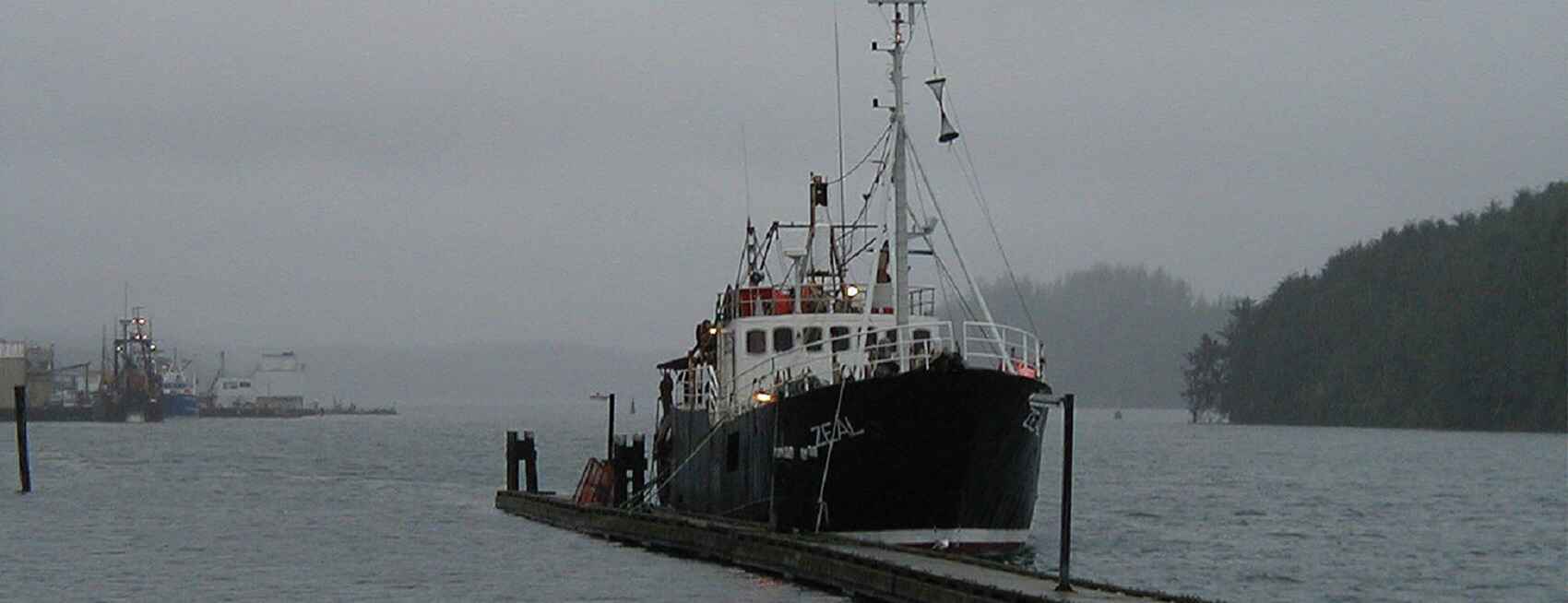
 Arriving on Vancouver Island by ferry from Horseshoe Bay to Nanaimo, with a day to spare before our next meeting, we headed towards Tofino, a small port town located about 40 km north of Ucluelet.The journey across the island took longer than expected as the road is very winding and rugged. It is a dead-end road; beyond lies the Pacific Ocean and China. The road passes through an impressive multi-century-old coniferous forest, called here the "Rain Forest."
Arriving on Vancouver Island by ferry from Horseshoe Bay to Nanaimo, with a day to spare before our next meeting, we headed towards Tofino, a small port town located about 40 km north of Ucluelet.The journey across the island took longer than expected as the road is very winding and rugged. It is a dead-end road; beyond lies the Pacific Ocean and China. The road passes through an impressive multi-century-old coniferous forest, called here the "Rain Forest."
 MacMillan Provincial Park (Cathedral Grove)
MacMillan Provincial Park (Cathedral Grove)
This small piece of magnificent forest is located near the center of Vancouver Island between Parksville and Port Alberni.Established in 1947, MacMillan Park is one of the last remnants of the temperate rainforest that covered the entire island more than a thousand years ago. The oldest Douglas firs are 500 years old.
A little further towards Port Alberni, there is an old sawmill in the middle of the forest, now operating at a very slow pace. A watermill powers the machinery, and it is in the wooden channels that one can see large salmon swimming upstream.Lakes, fjords, and finally the sea and open ocean.
Here in Tofino, a German came to settle and now runs his hotel-restaurant alone. The interior is a bit kitschy, and country music fills the room. "You like it? This is good music," he says to us. The rhythm of this traditional country and his accent remind us of the beer waltz in Munich. Fish and chips + a glass of red wine, and we're satisfied. Another original character who doesn’t miss his homeland and runs his business his own way, even if not everyone likes it. The room is clean, simple, and inexpensive, but breakfast, which was supposed to be between 8 am and 11 am, no longer exists. "It’s closed! Open at 2 o’clock!" says the innkeeper with his strong German accent, even though he’s been here for 40 years.
 At the port of this small town, the indigenous people and outsiders living on small surrounding islands come to restock. Fuel for boats, food for people, and then, with a motor push, they disappear over the horizon. There are also those small seaplanes that can land almost anywhere with great maneuverability.
At the port of this small town, the indigenous people and outsiders living on small surrounding islands come to restock. Fuel for boats, food for people, and then, with a motor push, they disappear over the horizon. There are also those small seaplanes that can land almost anywhere with great maneuverability.
Everyone is friendly here, the people are laid back. Those two young men repairing the engine of their small boat are in their own world, and their little mixed-breed dog is equally comfortable, jumping from the dock to the boat and vice versa.
 A sign, on the right side of the road leading to Ucluelet, indicates a viewpoint over the ocean through the "Rain Forest" or this humid jungle with its impressively trunked trees. The forest extends about 2 km further before joining the sea.
A sign, on the right side of the road leading to Ucluelet, indicates a viewpoint over the ocean through the "Rain Forest" or this humid jungle with its impressively trunked trees. The forest extends about 2 km further before joining the sea.
Two determined hikers, wearing hiking shoes and carrying small backpacks, head for a small trail that delves into this virgin forest. Taking advantage of their momentum, we decide to follow with a few steps behind. The path quickly becomes arduous, descending steeply, cluttered with roots and flooded with mud in places. I’ve seen identical paths on Reunion Island. Climbing, descending, and especially watching where you step. The most tiring part may be keeping your balance and constantly changing your rhythm.
The forest is truly untouched, thankfully the path is well marked and it’s not raining. Persevering in this challenging path, we finally reach, almost miraculously, a sandy beach where the salty sea air fills our lungs.
Ships must have anchored here, then dropped men, arms, and baggage in a heartbeat before confronting mother nature in all her grandeur. We are at the beginning and the end of the world.
On our way back, perched on a branch, a bird with blue and black feathers watches us without moving. It seems as if it feels beautiful and is posing for the photo.
 Adventure and tourism; I’m looking for a third dimension which perhaps is this: Ucluelet resembles Tofino but is larger. The houses, aligned along the shoreline, are built on stilts. They look more like large cabins with wide balconies overlooking the inlet. Wooden stairs provide access to floating docks; ideal stroll and guaranteed atmosphere.
Adventure and tourism; I’m looking for a third dimension which perhaps is this: Ucluelet resembles Tofino but is larger. The houses, aligned along the shoreline, are built on stilts. They look more like large cabins with wide balconies overlooking the inlet. Wooden stairs provide access to floating docks; ideal stroll and guaranteed atmosphere.
At the end of the dock, the Zeal, a beautiful fishing boat, is moored.
Once there, activity is in full swing, and lending a hand to replace protective tires between the hull and dock is gladly accepted.
 Jim, the captain, is a jovial and straightforward man; he invites me aboard and introduces me to his crew. One man maintaining the machinery, two refurbishing the kitchen, and one man eating soup standing up in his yellow raincoat.
James, the mechanic from the Northern Territories, Dwain, the professional fisherman, Dave, the chief engineer, and Darren, nicknamed Whity, the occasional cook, a lawyer by profession and son of the owner of the Zeal.
The weather is bad today, and yesterday a small tornado even grazed the coast. The boat will stay docked, and the men are taking the opportunity to put everything in order.
Jim, the captain, is a jovial and straightforward man; he invites me aboard and introduces me to his crew. One man maintaining the machinery, two refurbishing the kitchen, and one man eating soup standing up in his yellow raincoat.
James, the mechanic from the Northern Territories, Dwain, the professional fisherman, Dave, the chief engineer, and Darren, nicknamed Whity, the occasional cook, a lawyer by profession and son of the owner of the Zeal.
The weather is bad today, and yesterday a small tornado even grazed the coast. The boat will stay docked, and the men are taking the opportunity to put everything in order.
It’s a bit like at L’Etoile; work never ends, and the upcoming season is like the next voyage at sea. I’ve always compared L’Etoile to a cargo ship, with its boiler room serving as the engine room, the balcony that feels like the ship’s deck, and the visitors that take me on journeys. There’s also a captain, and the ship can sink too.
Jim, the captain, takes me on a tour of his ship; the bunks, the kitchen, the hallway, the hold where fish and ice are stored, the engine room, the deck with fishing nets, and finally the wheelhouse with the real wooden helm and brass thermometers of all sizes. A large computer screen connected to the web and GPS allows the pilot to know at all times the fish market value and his position. "It’s a good job, we earn a good living," Jim tells me as he comfortably settles in front of the wheel.
Outside, the weather doesn’t change, and the boat sways gently on the ripples; rain and wind have intensified. It feels good in the dining room shared with the kitchen. Each with a beer, the fire in the stove, and the excellent sandwiches served heartily by the cook.
Before Dave, the machinist, returns to his engine room and grease, I show them some digital photos of my region. Seen from a boat in British Columbia, the Cevennes and small medieval villages like La Garde Guerin seem very far away and leave an impression on the sailors, who enjoy the change of scenery. 5 months of work and 7 months of travel would certainly please the captain. Exchange of business cards and sincere handshakes.
We have just experienced true hospitality, which can rarely be found! As an innkeeper, I take away this spontaneous, unexpected, and very relevant lesson.
Ucluelet and Tofino, Vancouver Island, British Columbia, Canada - Map 


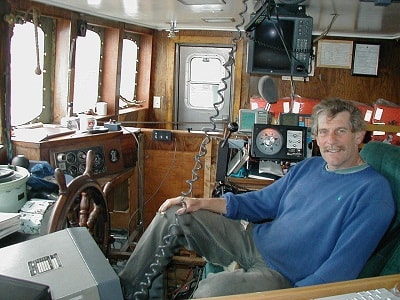



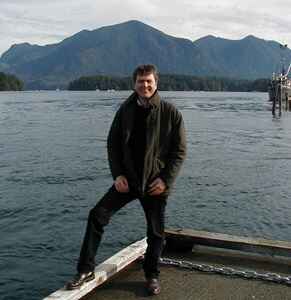
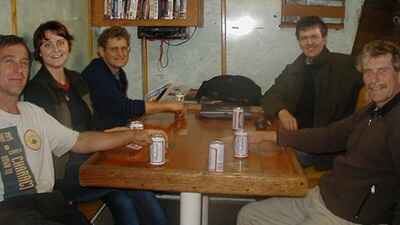



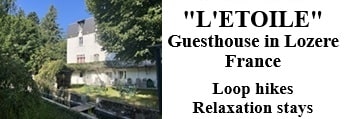
Former holiday hotel with a garden along the Allier, L'Etoile Guest House is located in La Bastide-Puylaurent between Lozere, Ardeche, and the Cevennes in the mountains of Southern France. At the crossroads of GR®7, GR®70 Stevenson Path, GR®72, GR®700 Regordane Way, GR®470 Allier River springs and gorges, GRP® Cevenol, Ardechoise Mountains, Margeride. Numerous loop trails for hiking and one-day biking excursions. Ideal for a relaxing and hiking getaway.
Copyright©etoile.fr

 Arriving on Vancouver Island by ferry from Horseshoe Bay to Nanaimo, with a day to spare before our next meeting, we headed towards Tofino, a small port town located about 40 km north of Ucluelet.The journey across the island took longer than expected as the road is very winding and rugged. It is a dead-end road; beyond lies the Pacific Ocean and China. The road passes through an impressive multi-century-old coniferous forest, called here the "Rain Forest."
Arriving on Vancouver Island by ferry from Horseshoe Bay to Nanaimo, with a day to spare before our next meeting, we headed towards Tofino, a small port town located about 40 km north of Ucluelet.The journey across the island took longer than expected as the road is very winding and rugged. It is a dead-end road; beyond lies the Pacific Ocean and China. The road passes through an impressive multi-century-old coniferous forest, called here the "Rain Forest." MacMillan Provincial Park (Cathedral Grove)
MacMillan Provincial Park (Cathedral Grove) At the port of this small town, the indigenous people and outsiders living on small surrounding islands come to restock. Fuel for boats, food for people, and then, with a motor push, they disappear over the horizon. There are also those small seaplanes that can land almost anywhere with great maneuverability.
At the port of this small town, the indigenous people and outsiders living on small surrounding islands come to restock. Fuel for boats, food for people, and then, with a motor push, they disappear over the horizon. There are also those small seaplanes that can land almost anywhere with great maneuverability. A sign, on the right side of the road leading to Ucluelet, indicates a viewpoint over the ocean through the "Rain Forest" or this humid jungle with its impressively trunked trees. The forest extends about 2 km further before joining the sea.
A sign, on the right side of the road leading to Ucluelet, indicates a viewpoint over the ocean through the "Rain Forest" or this humid jungle with its impressively trunked trees. The forest extends about 2 km further before joining the sea. Adventure and tourism; I’m looking for a third dimension which perhaps is this: Ucluelet resembles Tofino but is larger. The houses, aligned along the shoreline, are built on stilts. They look more like large cabins with wide balconies overlooking the inlet. Wooden stairs provide access to floating docks; ideal stroll and guaranteed atmosphere.
Adventure and tourism; I’m looking for a third dimension which perhaps is this: Ucluelet resembles Tofino but is larger. The houses, aligned along the shoreline, are built on stilts. They look more like large cabins with wide balconies overlooking the inlet. Wooden stairs provide access to floating docks; ideal stroll and guaranteed atmosphere. Jim, the captain, is a jovial and straightforward man; he invites me aboard and introduces me to his crew. One man maintaining the machinery, two refurbishing the kitchen, and one man eating soup standing up in his yellow raincoat.
James, the mechanic from the Northern Territories, Dwain, the professional fisherman, Dave, the chief engineer, and Darren, nicknamed Whity, the occasional cook, a lawyer by profession and son of the owner of the Zeal.
The weather is bad today, and yesterday a small tornado even grazed the coast. The boat will stay docked, and the men are taking the opportunity to put everything in order.
Jim, the captain, is a jovial and straightforward man; he invites me aboard and introduces me to his crew. One man maintaining the machinery, two refurbishing the kitchen, and one man eating soup standing up in his yellow raincoat.
James, the mechanic from the Northern Territories, Dwain, the professional fisherman, Dave, the chief engineer, and Darren, nicknamed Whity, the occasional cook, a lawyer by profession and son of the owner of the Zeal.
The weather is bad today, and yesterday a small tornado even grazed the coast. The boat will stay docked, and the men are taking the opportunity to put everything in order.










